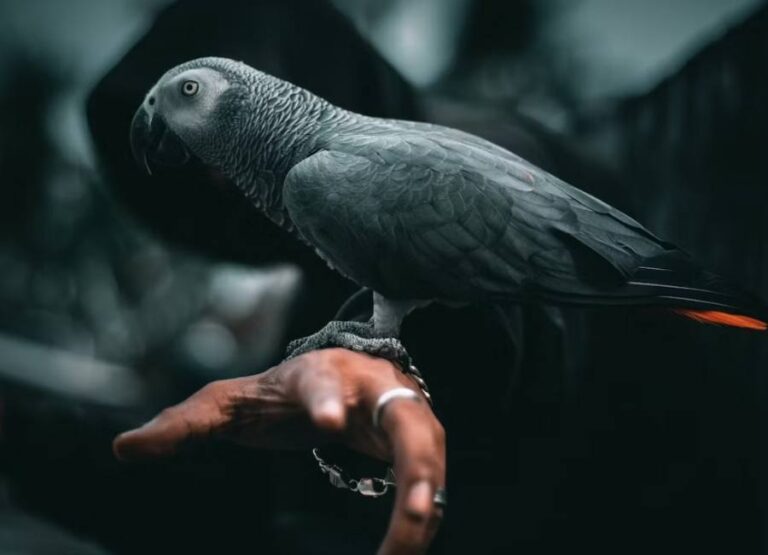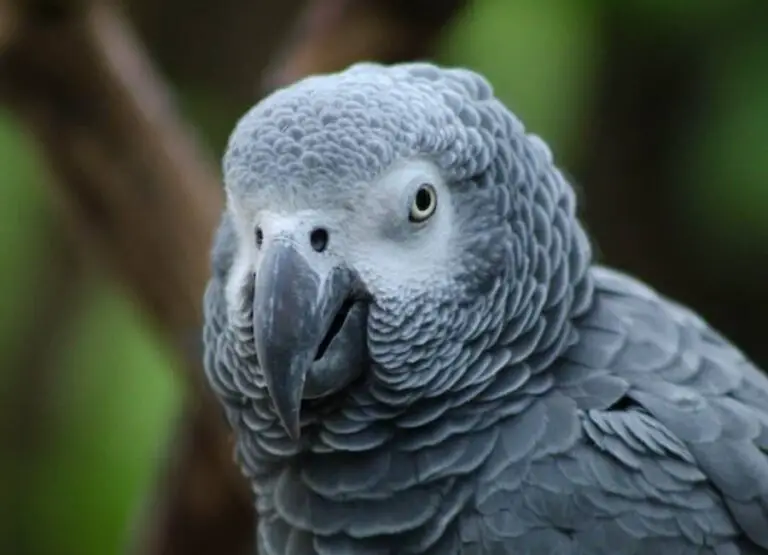13 Top Signs of a Happy African Grey
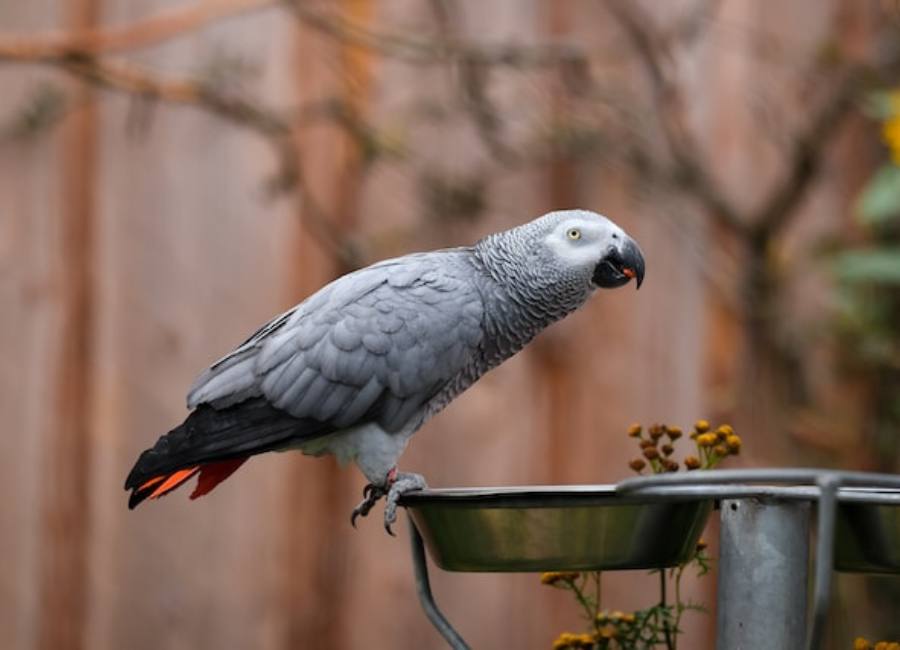
Are you looking to keep your African Grey happy and content? These intelligent birds can be great companions, but it’s important to make sure they’re healthy and satisfied.
One key sign of a happy African Grey is its behavior and body language. By paying attention to their actions and subtle cues, you can ensure your feathered friend is living their best life.
In this post, we’ll explore some of the top signs of a happy African Grey and give you tips on how to keep your bird thriving.
Let’s get started…
Signs of a happy African grey
The following are some of the most common signs of a happy African grey:
1. Fluffed Feathers
When an African Grey Parrot is delighted, their feathers fluff up, giving them a lovely and attractive puffball appearance.
This behavior reflects their contentment and calms in their surroundings.
It’s as if they’re wearing a comfortable feathery sweater, displaying their comfort and well-being.
Their fluffed feathers provide an attractive visual clue that they are in complete contentment.
2. Alert and Curious Stance
A cheerful African Grey Parrot will maintain an attentive posture and show real interest in their environment.
They will be very aware of their surroundings, twisting their heads to take in every aspect.
Their bright, alert eyes indicate their active and engaged mental state as they actively absorb the environment around them.
Their erect attitude exudes confidence and excitement, suggesting their contentment with their surroundings.
3. Enthusiastic Vocalizations
A happy African Grey Parrot is a talker! They will converse with their human partners in bright and beautiful tones.
These vocalizations can include copying human speech, mimicking home sounds such as doorbells or phone rings, or even singing along to their favorite songs.
They may engage in vocal duets and joyful conversation with their own reflection in a mirror.
Each chirp, scream, and whistle is full of life and energy, showing their joy and excitement for life.
4. Feather Preening
The African Grey Parrot is well-known for its careful grooming practices.
When they are content, they will spend time preening their feathers and making sure they are in perfect condition.
They delicately arrange each feather with their beak, eradicating any dirt or debris.
This practice not only helps to keep their feathers healthy but also encourages bonding and a sense of well-being.
Their soft and meticulous preening actions convey their comfort and satisfaction.
5. Relaxed Body Language
When you observe an African Grey Parrot in a state of contentment, you will note that their body language relaxes.
They may drop their wings slightly, bring their feathers closer to their bodies, and maintain a calm disposition free of worry or nervousness.
Their muscles are loose and relaxed, signifying contentment and emotional well-being.
Their comfortable body language reflects their inner satisfaction and peace.
6. Playful Interactions
Playfulness is one of the telltale indications of a happy African Grey Parrot.
They may participate in a variety of activities to keep themselves and their human partners entertained.
Hanging upside down from their perch, swinging on toys, or even beginning games like peek-a-boo or fetch are examples of this.
They may demonstrate their delight by hopping from one foot to the other or executing acrobatic motions.
Their amusing acts not only delight us but also reflect their joy and love for life.
7. Engaging in Toys and Enrichment
The African Grey Parrots are bright animals that enjoy cerebral stimulation.
A contented parrot will eagerly engage in toys and enrichment activities.
They may solve puzzles, move things, or play foraging games to demonstrate their active and inquisitive attitude.
This activity not only keeps their wits fresh but also gives them a sense of accomplishment and entertainment.
They may express their excitement and contentment by vocalizing eagerly while examining toys or exhibiting resolve when tackling a task.
8. Active Vocal Mimicry
African Grey Parrots are well-known for their vocal mimicry abilities. When they are happy, they may display this gift by imitating a variety of sounds.
They may imitate human speech, home noises such as doorbells or laughter, and even song tunes.
Their capacity to accurately mimic reflects their joy and satisfaction from engaging with their environment.
They may make a series of hilariously realistic impersonations, garnering the attention and admiration of their human partners.
9. Appetite and Eating Habits
A contented African Grey Parrot eats well. They approach their food with eagerness and show enthusiasm during mealtime.
They may bob their heads up and down, indicating eagerness and anticipation as they eat their favorite delicacies or try something new.
They may even throw and manipulate their food in a fun manner, participating in food-related activities that offer them joy.
Their voracious hunger indicates their contentment and satisfaction with their physical well-being.
10. Exploratory Behavior
A happy African Grey Parrot enjoys exploring their surroundings.
They may explore different regions of their environment and investigate new toys or things with curiosity and delight.
Their quick movements and inquisitive temperament indicate their happiness and eagerness to interact with the world around them.
They may hop from perch to perch, climb on furniture, or even probe secret corners, always looking for new experiences and discoveries.
11. Affectionate Gestures
African Grey Parrots make friendly gestures toward their beloved human friends when they are happy.
As a sign of confidence and love, they may lean towards them, rub their head against their fingers, or even nibble gently.
They appreciate physical contact and look for ways to bond with their favorite humans, expressing their satisfaction through these affectionate encounters.
Their loving acts build a strong emotional connection and strengthen the tie between the parrot and the human.
12. Responsive to Interaction
Social engagement is essential for African Grey Parrots.
When they are content, they will eagerly respond to their human partners, engaging in conversation and actively participating in the connection.
They may bend their heads, make eye contact, and mimic the rhythm and tone of human speech in order to demonstrate their desire to communicate and connect.
They like the attention and respond enthusiastically, creating a deep bond and a positive social atmosphere.
13. Playful Dancing
Last but not least, a delighted African Grey Parrot may do a wonderful dance routine!
They may bob their heads, hop about, or even flap their wings in time to their favorite songs or cheery human gestures.
This intense expression of joy demonstrates their joy and zeal, offering a beautiful spectacle for both the parrot and its human partners.
Their exuberant dances demonstrate their enthusiasm for life and capacity to find joy in the most insignificant of circumstances.
Find out more about how to identify an unhappy African grey parrot.
Ways to keep your African grey happy
Here are some possible ways to keep your African grey parrot happy:
- Provide a spacious and comfortable enclosure: Make sure your African grey has ample space to move around and fly within their enclosure. Also, ensure that they have comfortable perches, toys, and accessories inside their enclosure.
- Provide a healthy and nutritious diet: Provide your African grey with a well-balanced diet that includes fresh fruits, vegetables, and high-quality pellets.
- Allow your African grey ample socialization time: African greys are highly social birds that require lots of attention and interaction. Spend time playing with your African grey, teaching them new tricks, and talking to them.
- Provide ample mental stimulation: African greys are intelligent birds that require mental stimulation to stay happy and healthy. Provide them with toys, puzzles, and other mentally stimulating activities.
- Train them to talk: African greys are renowned for their ability to mimic human speech. Spend time training your African grey to talk, and engage them in conversation.
- Provide regular exercise: African greys benefit from regular exercise, which helps them stay healthy both physically and mentally. Encourage them to fly and play in and outside their enclosure.
- Regular visits to an avian veterinarian: Regular visits to an avian veterinarian are essential for the health and well-being of your African grey.
- Don’t keep them in isolation: African greys are social birds that thrive when they have the company of other birds or humans. Don’t keep them in isolation for prolonged periods.
- Avoid stressful situations: African greys are sensitive birds that are easily stressed. Avoid stressful situations, such as loud noises, sudden movements, and changes in their surroundings, as they can cause your African grey to become agitated and unhappy.
Related questions
How can I tell if my African Grey is happy?
There are several signs that can indicate a happy African Grey, including vocalization, playful behavior, and smooth, relaxed body language. A happy bird will often chirp, whistle, and mimic sounds, and may engage in games or other playful activities. They will also typically have a relaxed body posture, with feathers smooth and beaks partially open.
Can African Greys show affection to their owners?
Absolutely! African Greys are known for their intelligence and ability to form strong bonds with their human owners. They may show affection by mimicking speech or behaviors, cuddling, and even seeking out physical contact with their favorite people.
Should I be concerned if my African Grey is not talking or mimicking sounds?
Not necessarily. While some African Greys are highly vocal and love to mimic sounds, others may be quieter or less interested in this behavior. If your bird is otherwise healthy and engaging in normal activities, there may be nothing to worry about.
What kind of diet is best for a happy African Grey?
A balanced diet is key to keeping your African Grey healthy and happy. This should include a combination of high-quality pellets, fresh fruits and vegetables, and occasional treats such as nuts or seeds. Consult with your veterinarian or a bird nutrition specialist to determine the best diet for your bird’s individual needs.
Can African Greys get lonely?
Yes, African Greys are social birds that enjoy interaction with other birds or humans. If your bird is regularly left alone for long periods of time or does not have appropriate socialization opportunities, it may become bored or lonely. Consider providing toys, puzzles, or other stimulating activities for your bird, or seeking out opportunities for socialization with other birds or people.
How can I make sure my African Grey is comfortable in their environment?
Providing appropriate environmental enrichment is key to keeping your African Grey happy and healthy. This includes providing plenty of space for your bird to move and play, as well as perches, toys, and other stimulating objects to keep them engaged. You should also ensure that your bird’s cage is clean and well-maintained, with appropriate bedding and food and water sources.
Conclusion
In conclusion, owning an African Grey can be an incredibly enriching experience, but it’s important to pay attention to subtle signs that indicate their happiness.
From a healthy appetite and playful demeanor to affectionate gestures and excellent communication skills, there are many clear indicators that your feathered friend is content.
By nurturing a positive relationship with your African Grey, you can create a happy and harmonious home for both you and your beloved pet.

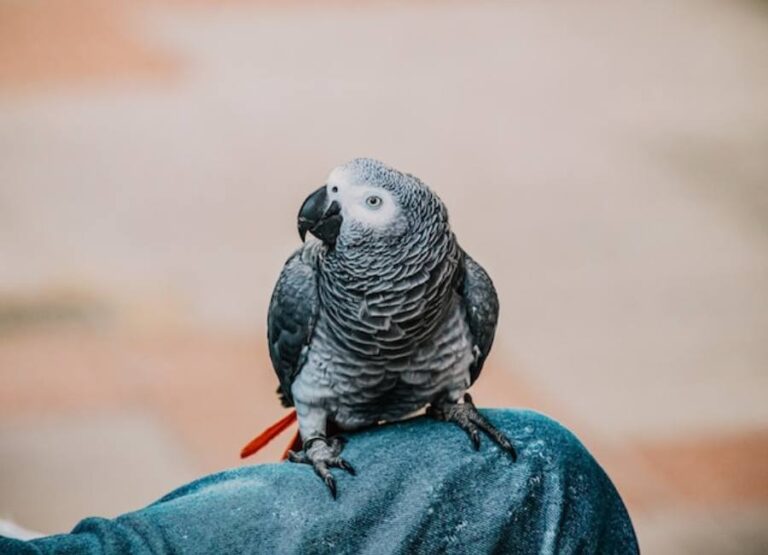
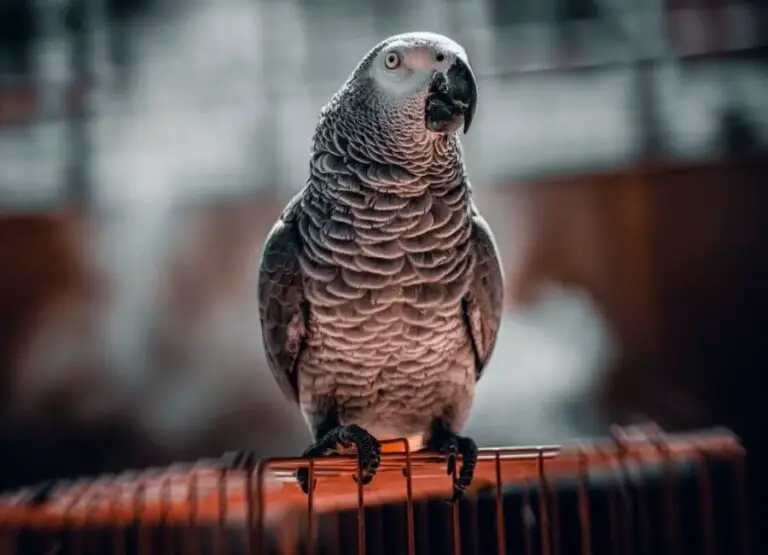
![Why is my African Grey Aggressive [11 Reasons] Why is my African Grey Aggressive](https://petcreeks.com/wp-content/uploads/2023/06/Why-is-my-African-Grey-Aggressive-768x555.jpg)
